- Home
- P. D. James
Death in Holy Orders Page 31
Death in Holy Orders Read online
Page 31
Piers had followed up the discovery. He said, “If we’re right and the caller later rang the Archdeacon’s mobile, then everyone who attended Compline is in the clear. That leaves us with Surtees and his sister, Gregory, Inspector Yarwood, the Pilbeams and Emma Lavenham. I don’t suppose any of us see Or Lavenham as a serious suspect and we’re discounting Stannard.”
Dalgliesh said, “Not entirely. We’ve no power to hold him and I’m pretty certain he has no idea how Crampton died. That doesn’t necessarily mean he wasn’t implicated. He’s out of St. Anselm’s but not out of mind.”
Piers said, “There’s one thing, though. Arbuthnot only just arrived in the sacristy in time for the service. I got that bit of information from Father Sebastian who had no idea, of course, of its importance. Robbins and I have checked, sir. Both of us could run from the door into the south cloister and across the courtyard in ten seconds. He’d just have had time to make the call and get to the church by nine-thirty.”
Kate said, “It’d be risky, wouldn’t it? Anyone could have seen him.”
“In the dark? And with the dim lights in the cloister? And who was there to see him? They were in church. It wasn’t much of a risk.”
Robbins said, “I wonder if it would be premature, sir, to exclude everyone in church. Suppose Cain had an accomplice. There’s nothing to show that this was a one-man crime. Anyone who was actually in the church before nine twenty-eight couldn’t have made the call but that doesn’t mean one of them wasn’t implicated in the murder.”
Piers said, “A conspiracy? Well it could be. There were enough of them here who hated him. A one-man and one-woman crime maybe. When Kate and I interviewed the Surteeses it was pretty obvious that they were hiding something. Eric was frankly terrified.”
The only suspect who had produced anything of interest had been Karen Surtees. She had claimed that neither she nor her brother had left St. John’s Cottage at any time during the evening. They had watched television until eleven and then had gone to bed. Asked by Kate whether either of them could have left the cottage without the other knowing, she had said, “That’s a pretty crude way of asking whether either of us went out in a storm to murder the Archdeacon. Well, we didn’t. And if you think Eric could have left the cottage without my knowing, the answer is no. We slept in the same bed, if you must know. I’m actually his half-sister and, even if I weren’t, you’re investigating murder, not incest, and it’s none of your business anyway.”
Dalgliesh said, “And you were both convinced she was telling the truth?”
Kate said, “One look at her brother’s face showed us that. I don’t know whether she’d told him what she proposed to say, but he didn’t like it. And it’s odd, isn’t it, that she bothered to tell us that? She could perfectly well have said that the storm kept them both awake for most of the night and provided an alibi that way. OK, I think she’s a woman who likes to shock, but that doesn’t seem reason enough for telling us about the incest if that’s what it is.”
Piers said, “It shows she was damned anxious to provide an alibi though, doesn’t it? It’s almost as if the two of them are thinking ahead, telling the truth now because in the end they might have to rely on it in court.”
A twig had been found in Raphael Arbuthnot’s set in the north cloister but the SO COs had discovered nothing else of interest. During the day Dalgliesh had become confirmed in his initial view of its importance. If he were right in his theory, the twig was indeed a vital clue, but he judged that to voice his suspicions now would be premature.
They discussed the results of the individual interviews. Except for
Raphael, everyone in college or in the cottages claimed to have been virtuously in bed by eleven-thirty and, although occasionally disturbed by the force of the wind, had seen or heard nothing unusual during the night. Father Sebastian had been co-operative but cool. It was only with difficulty that he had concealed his dislike of being interviewed by subordinates and he had begun by saying that he could spare only a short time as he was expecting Mrs. Crampton to arrive. A short time was all that was necessary. The Warden’s story was that he had worked on an article he was contributing to a theological journal until eleven and had been in bed by eleven-thirty after his usual nightcap of whisky. Father John Betterton and his sister had read until half past ten, after which Miss Betterton had brewed cocoa for them both. The Pilbeams had watched television and had fortified themselves against a stormy night with copious cups of tea.
By eight o’clock it was time to end for the day. The SO COs had long departed to their hotel and now Kate, Piers and Robbins said their good-nights. Tomorrow Kate and Robbins would drive to Ashcombe House to see what, if anything, could be learned about Margaret Munroe’s time there. Dalgliesh locked up the papers he needed to keep private in his briefcase and walked across the headland into the western court to Jerome.
The telephone rang. It was Mrs. Pilbeam. Father Sebastian had suggested that Commander Dalgliesh might like to have dinner in his set. It would save him the journey to Southwold. It would only be soup followed by salad and cold meat and some fruit but, if that was enough, Pilbeam would be happy to bring it over. Glad to be spared the car journey, Dalgliesh thanked her and said that the meal would be very welcome. It arrived within ten minutes, carried by Pilbeam. Dalgliesh suspected that he was unwilling for his wife to walk even the short distance across the courtyard after dark. Now, with surprising dexterity, he drew the desk a little away from the wall, laid the table and set out the meal.
Pilbeam said, “If you just leave the tray outside, sir, I’ll fetch it in about an hour.”
The thermos contained minestrone soup thick with vegetables and pasta and was obviously home-made. Mrs. Pilbeam had provided a bowl of grated Parmesan cheese and there were hot rolls, wrapped in a napkin, and butter. Under the cover was a plate of salad and excellent ham. Someone, perhaps Father Sebastian, had supplied a bottle of claret although not a wineglass, but Dalgliesh, unwilling to drink alone, put it in the cupboard and after the meal brewed himself coffee. He placed the tray outside and, minutes later, heard Pilbeam’s heavy tread on the stones of the cloister. He opened the door to say thank you and good-night.
He found himself in that discouraging state of physical tiredness and mental stimulation which is fatal to sleep. The silence was eerie, and when he went to the window he saw the college as a black silhouette, chimneys, tower and cupola an unbroken mass against a paler sky. The blue and white police tape was still looped around the columns of the north cloister, which was now almost clear of leaves. In the glow from the light above the south cloister door, the cobbles of the courtyard glistened and the fuchsia looked as unnaturally bright and incongruous as a splash of red paint flung against the stone wall.
He settled down to read but the peace around him found no echo within. What was it, he wondered, about this place which made him feel that his life was under judgement? He thought about the long years of self-imposed solitude since his wife’s death. Hadn’t he used his job to avoid the commitment of love, to keep inviolate more than that high uncluttered flat above the Thames which, when he returned to it at night, looked exactly the same as it had when he left it in the morning ? To be a detached observer of life was not without dignity; to have a job which preserved your own privacy while providing you with the excuse indeed the duty to invade the privacy of others had its advantages for a writer. But wasn’t there something ignoble about it? If you stood apart long enough, weren’t you in danger of stifling, perhaps even losing, that quickening spirit which the priests here would call the soul? Six lines of verse came into his mind and he took a page of paper, ripped it in half, and wrote them down:
Epitaph for a Dead Poet Buried at last who was so wise, Six foot by three in clay he lies. Where no hands reach, where no lips move, Where no voice importunes his love. How odd he cannot know nor see This last fine self-sufficiency.
After a second he scribbled beneath it “With apologies to Marvell’. He t
hought back to the days when his poetry had come as easily as had this light ironic verse. Now it was a more cerebral, a more calculated choice and arrangement of words. Was there anything in his life that was spontaneous?
He told himself that this introspection was becoming morbid. To shake it off he had to get out of St. Anselm’s. What he needed before bed was a brisk walk. He closed the door to Jerome, passed Ambrose from which no lights were visible behind the tightly-drawn curtains and, unlocking the iron gate, turned resolutely south, making his way towards the sea.
It was Miss Arbuthnot who had decreed that there should be no locks on the doors of the ordinands’ rooms. Emma wondered what she had feared they might do if not always at risk of interruption. Had there been, perhaps, an unacknowledged fear of sexuality? Perhaps as a consequence, no locks had been fitted in the visitors’ sets. The locked iron gate by the church gave all the night-time security considered necessary; behind that elegantly designed barrier what was there to fear? Because there was no tradition of locks and bolts, none were available in college to be fitted and Pilbeam had been too busy all day to go to Lowestoft to buy them, even if he could have found a shop open on a Sunday. Father Sebastian had asked Emma whether she would be more comfortable in the main building. Emma, unwilling to betray nervousness, had assured the Warden that she would be perfectly all right. Father Sebastian hadn’t asked her again and, when she returned to the set after Compline to discover that locks hadn’t been fitted, she was too proud to seek him out, confess her fear and say that she had changed her mind.
She undressed and put on her dressing-gown, then settled down at her laptop and resolutely tried to work. But she was too tired. Thoughts and words came in a jumble overlaid by the events of the day. It had been late in the morning before Robbins had sought her out and asked her to come to the interview room. There Dalgliesh, with Inspector Miskin on his left, had taken her briefly through the events of the previous night. Emma had explained how she had been woken by the wind and had heard the clear note of the bell. She couldn’t explain why she had put on her dressing-gown and gone down to investigate. It now seemed rash and stupid. She thought she must have been half-asleep or perhaps the single chime heard through the wind had woken a semi-conscious memory of the insistent bells of childhood and adolescence, a call to be sharply obeyed, not questioned.
But she had been fully awake when she had pushed open the church door and seen between the pillars the brightly lit Doom and the two figures, the one prone and the other collapsed over him in an attitude of pity or despair. Dalgliesh hadn’t asked her to describe the scene in detail. Why should he, she thought; he’d been there. He didn’t express sympathy or concern for what she had gone through, but then it wasn’t she who was bereaved. The questions were clear and simple. It wasn’t, she thought, that he had been trying to spare her; if there had been anything he wanted to know, he would have asked, whatever her distress. When Sergeant Robbins had first shown her into the interview room and Commander Dalgliesh had risen from his chair and invited her to sit, she had told herself: I’m not facing the man who wrote A Case to Answer and Other Poems, I’m facing a policeman. In this they could never be allies. There were people she loved and wanted to protect; he had no allegiance except to the truth. And at the end had come the question she had dreaded.
“Did Father Martin speak when you went up to him?”
She had paused before replying.
“Yes, just a few words.” , “What were they, Dr. Lavenham?”
She didn’t reply. She wouldn’t lie, but even to recall the words now seemed an act of treachery.
The silence lengthened, then he said, “Dr. Lavenham, you saw the body. You saw what had been done to the Archdeacon. He was a tall, strong man. Father Martin is nearly eighty years old and becoming feeble. The brass candlestick, if it proves to be the weapon, would take some strength to wield. Do you really believe Father Martin could have done it?”
She had cried out vehemently, “Of course not! He’s incapable of cruelty. He’s kind and loving and good, the best man I know. I never thought that. No one could.”
Commander Dalgliesh had said quietly, “Then why do you suppose I do?”
He asked the question again. Emma looked him in the eyes.
“He said, “Oh God, what have we done, what have we done?”
“And what do you suppose thinking about it later he meant by that?”
She had thought about it later. They had not been words to forget. Nothing about that scene would ever be forgotten. She kept her eyes on her interrogator.
“I think he meant that the Archdeacon would still be alive if he hadn’t come to St. Anselm’s. Perhaps he wouldn’t have been murdered if his killer hadn’t known how strongly he was disliked here. That dislike could have contributed to his death. The college can’t be guiltless.”
“Yes,” he had said more gently, ‘that’s what Father Martin has told me he meant.”
She looked at her watch. It was twenty past eleven. Knowing that it would be impossible to work, she went up to her bed. Because the set of rooms was at the end of the row, the bedroom had two windows, one of which looked out over the south wall of the church. She drew the curtains before getting into bed and tried resolutely to forget the unlocked door. She shut her eyes, only to find images of death bubbling like blood on her retina, reality made more terrible by imagination. She saw again the viscous pool of spilt blood, but now there lay above it like grey vomit a spatter of his brains. The grotesque images of the damned and grinning devils jerked into life and animated their obscene gestures. When she opened her eyes in the hope of banishing horror, the darkness of the bedroom pressed upon her. Even the air smelt of death.
She got out of bed and, unlatching the window facing the scrubland, pushed it open. There came a blessed rush of air and she gazed out over the vast silence and a sky pricked with stars.
She went back to bed, but sleep wouldn’t come. Her legs were juddering with tiredness but fear was stronger than exhaustion. At last she got up and went downstairs. To watch in darkness that unlocked door was less traumatic than to imagine it opening slowly, to be in the sitting-room was better than lying helpless, waiting to hear those purposeful footsteps on the stairs. She wondered whether to ram a chair under the door handle, but couldn’t bring herself to an action that seemed both demeaning and ineffectual. She despised herself for cowardice, telling herself that no one intended her harm. But then the images of cracked bones came back into her mind. Someone on the headland, perhaps someone in the college, had taken a brass candlestick and smashed the Archdeacon’s skull, striking again and again in a frenzy of bloodlust and hatred. Could that have been the action of someone sane? Was anyone at St. Anselm’s safe?
It was then that she heard the rasp of the iron gate opening, the click as it was shut. Footsteps were passing. They were confident but quiet, there was nothing furtive about this tread. Carefully she opened her door and glanced out, her heart thumping. Commander
Dalgliesh was opening the door of Jerome. She must have made some sound because he turned and came over to her and she opened the door to him. The relief of seeing him, of seeing any human being, was overwhelming. She knew that it must show in her face.
He said, “Are you all right?”
She managed a smile.
“Not very at present, but I shall be. I was finding it difficult to sleep.”
He said, “I thought you would have moved to the main house. Didn’t Father Sebastian suggest it?”
“He did offer but I thought I’d be all right here.”
He looked across at the church. He said, “This isn’t a good set for you. Would you like to change with me? I think you’d find it more comfortable.”
She found it difficult to conceal her relief.
“But wouldn’t that be a bother?”
“Not in the slightest. We could move most of our things tomorrow. All you need now are bedclothes. I’m afraid your under-sheet may not fit my bed.
Mine’s a double.”
She said, “Shall we just change our pillows and duvets?”
“Good idea.”
Carrying them into Jerome, she saw that he had already brought his own pillows and duvet downstairs and had lain them on one of the armchairs. Beside them was a canvas and leather grip. Perhaps he had put together the things he needed for the night and next day.
Going over to the cupboard, he said, “The college has provided the usual innocuous drinks for us, and there’s half a pint of milk in the fridge. Would you like cocoa or Ovaltine? Or, if you prefer, I’ve a bottle of claret.”
“I’d like some wine, please.”
He shifted the duvet for her and she sat down. He took a bottle, a corkscrew and two tumblers from the small cupboard.
“Obviously the college doesn’t expect its guests to be drinking wine. We have the choice of tumblers or mugs.”
“A tumbler is fine. But it means opening a new bottle.”
“The best time to open it, when it’s needed.”
She was surprised how much at ease she felt with him. That’s all I needed, she told herself, someone else to be here. They didn’t talk for long, only until a single glass of wine had been finished. They drank slowly. He spoke of coming to the college as a boy, of the fathers,
their cassocks hitched up, bowling to him on a pitch behind the west gate; cycling into Lowestoft to buy fish; the pleasure of solitary reading in the library at night. He asked about the syllabus for her class at St. Anselm’s, how she chose the poets to study, what kind of response she got from the ordinands. The murder wasn’t mentioned. Their talk wasn’t desultory but neither was it forced. She liked the sound of his voice. She had the sensation that part of her mind was detached, floating above them and being soothed by this low male and female contrapuntal sound.
When she got up and said good-night, he rose at once and said with a formality he hadn’t so far shown, “I shall be spending the night in this armchair unless you object. If Inspector Miskin had been here I’d have asked her to stay. As she isn’t, I’ll take her place -unless you’d rather I didn’t.”

 The Skull Beneath the Skin
The Skull Beneath the Skin A Taste for Death
A Taste for Death The Children of Men
The Children of Men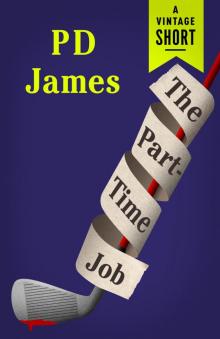 The Part-Time Job
The Part-Time Job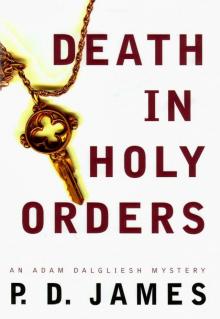 Death in Holy Orders
Death in Holy Orders The Victim
The Victim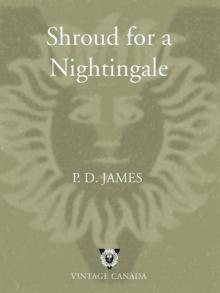 Shroud for a Nightingale
Shroud for a Nightingale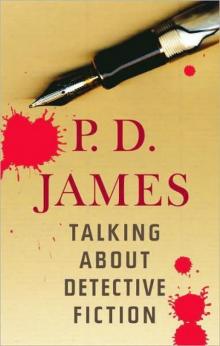 Talking about Detective Fiction
Talking about Detective Fiction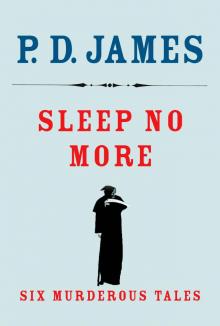 Sleep No More
Sleep No More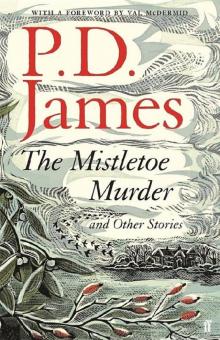 The Mistletoe Murder and Other Stories
The Mistletoe Murder and Other Stories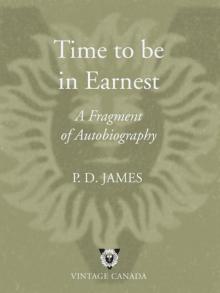 Time to Be in Earnest
Time to Be in Earnest Original Sin
Original Sin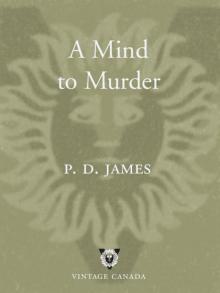 A Mind to Murder
A Mind to Murder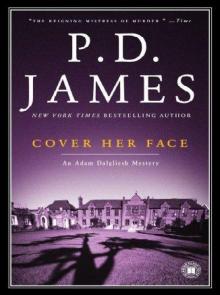 Cover Her Face
Cover Her Face Innocent Blood
Innocent Blood Devices and Desires
Devices and Desires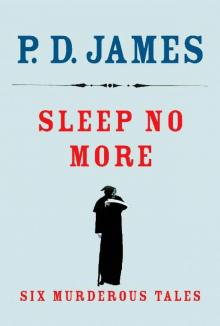 Sleep No More: Six Murderous Tales
Sleep No More: Six Murderous Tales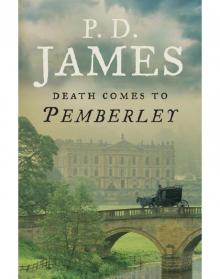 Death Comes to Pemberley
Death Comes to Pemberley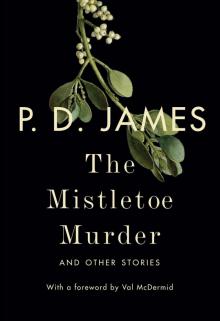 The Mistletoe Murder
The Mistletoe Murder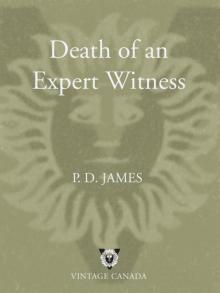 Death of an Expert Witness
Death of an Expert Witness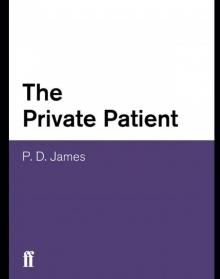 The Private Patient
The Private Patient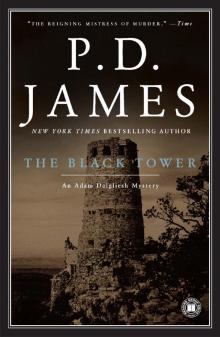 The Black Tower
The Black Tower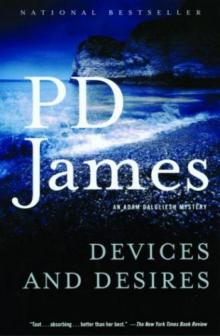 Devices & Desires - Dalgleish 08
Devices & Desires - Dalgleish 08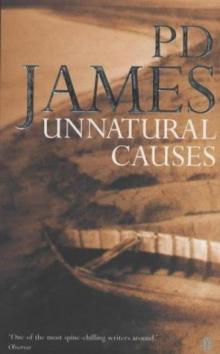 Unnatural Causes
Unnatural Causes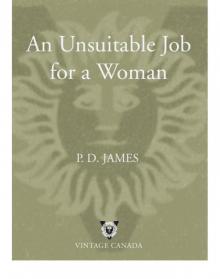 An Unsuitable Job for a Woman
An Unsuitable Job for a Woman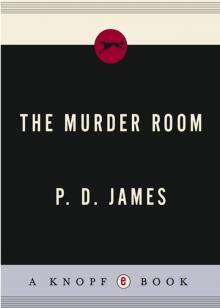 The Murder Room
The Murder Room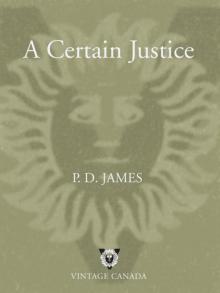 A Certain Justice
A Certain Justice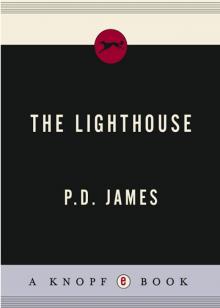 The Lighthouse
The Lighthouse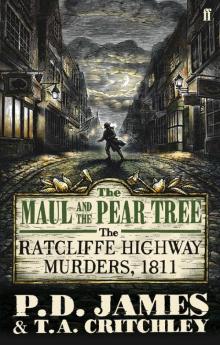 The Maul and the Pear Tree
The Maul and the Pear Tree